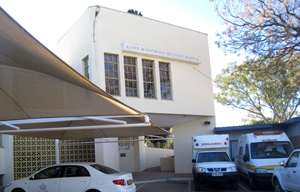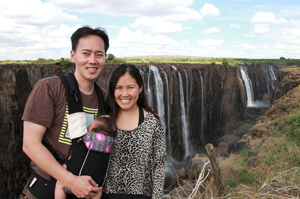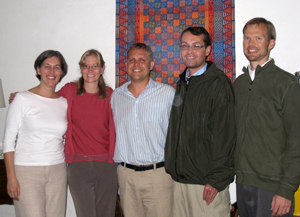
If one looks at the old class rosters from our School of Medicine, you see names that are now embedded in our mission history. The Class of 1920—just our sixth graduating class—is no exception. Steen, Coffin, and Kretchmar are names that immediately struck me as an early generation of those who came, studied, and went—to the far corners of this globe. The world was still reeling from the aftermath of World War I when they graduated, interned, and then accepted their calls to unknown places.
Arthur Kretchmar answered his call to a remote corner of Africa without a recognized name, which later became Bechuanaland, and eventually Botswana. An Adventist missionary family by the name of Anderson was working in the countryside and recognized the value a western physician could bring to the local people. Dr. Kretchmar answered that call, but he first had to go to England for a few months to establish his British credentials, as Bechuanaland was a British Protectorate. Then he went by ship to South Africa, and by land to a remote valley called Kanye, where he started to see patients.
The local people were afraid of having surgery unless their chief came into the operating room with them, but gradually confidence grew and the Kretchmars became a valued part of that community. The local Bangwaketse tribe was unable to pronounce Kretchmar, so they called him Tshoma. After two years, Dr. Kretchmar informed the local chiefs that he could not stay unless he was allowed to have a church to worship his God, something they had resisted. This created quite a discussion, but out of fear of losing "their" doctor, it was eventually allowed, and the first Adventist church in Botswana was built at Kanye.
 I was privileged to preach in that church a few weeks ago. Sitting on a bluff overlooking a sprawling village of 40,000, the Kanye Adventist church is full and has spawned a number of other churches in the area.
I was privileged to preach in that church a few weeks ago. Sitting on a bluff overlooking a sprawling village of 40,000, the Kanye Adventist church is full and has spawned a number of other churches in the area.
Across the road is Kanye Adventist Hospital, a modern 167-bed hospital and referral center that still sets the standards for quality health care in this part of Botswana, some 100 kilometers from Gaborone, the capital. It is led by Dr. Bangwato Sikwa, an energetic ob/gyn doctor turned administrator. Seth and Yemina Lukens are the latest in a long series of Loma Linda graduates who have worked there. They met as missionary kids at Maluti Hospital in Lesotho, two countries over, and have now returned, after finishing Seth’s family medicine residency and Yemina’s nursing degree, with their three small children to Kanye. The hospital has asked to affiliate with Adventist Health International (AHI) as it struggles to keep pace with modern health care needs.
 My other reason for being in Africa was to chair AHI board meetings in Malawi and Zambia. For those who may question the commitment of our young graduates today, I wish you could have been with me. As I watched and listened to what they are doing, in partnership with their national colleagues, my heart was moved. Janie and Paul Yoo are making an incredible impact in Lusaka, Zambia. Paul has established a bustling dental clinic, caring for many members of the community. Janie runs our Lusaka Eye Hospital, doing both simple and sophisticated eye surgeries, including the first cornea transplants in the country.
My other reason for being in Africa was to chair AHI board meetings in Malawi and Zambia. For those who may question the commitment of our young graduates today, I wish you could have been with me. As I watched and listened to what they are doing, in partnership with their national colleagues, my heart was moved. Janie and Paul Yoo are making an incredible impact in Lusaka, Zambia. Paul has established a bustling dental clinic, caring for many members of the community. Janie runs our Lusaka Eye Hospital, doing both simple and sophisticated eye surgeries, including the first cornea transplants in the country.
Mwami Hospital, in northeast Zambia, has been asked by the government to upgrade its long-recognized nursing school to a diploma program and expand its enrollment. Our agriculture program at Mwami now feeds the campus and sells surplus maize to help support the hospital.
And then there is Malawi. Though a small country, Malawi is full of energy and dreams. AHI was asked to begin work there eight years ago, when our major health institutions in Blantyre and Malamulo were struggling for survival. Now they are out of debt and thriving, housing a growing number of our LLU graduates. With five LLU School of Medicine grads—Cristy Shank, Ryan Hayton and Jamie Crounse at Malamulo, and Tiffany Priester and David Saunders in Blantyre—they cover disciplines as diverse as cardiology, infectious disease, surgery, family, and preventive medicine. The amazing thing is they all graduated from LLU between 2004 and 2007. When we add in our other grads—Julie-Anne Satterfield from nursing and Danielle Davis from pharmacy—we have what we are calling our Malawi Field Station. Edward Martin and Christi Carlton from public health have just finished their terms of service at Malamulo, and we thank them for their contributions.
 With this collective energy and enthusiasm in one small country, watch what happens. Our fourth-year surgery residents from Loma Linda each rotate there for two months at a time. Plans are being finalized to start a surgery residency for medical students from Malawi and surrounding countries. Other residency programs are in the works. The Malamulo College of Health Sciences now offers four programs—nursing, medical assistant, laboratory technology, and clinical officers—and is ready to upgrade and expand. We expect to recapture its prominence from years gone by, when it set the educational standards for this part of Africa.
With this collective energy and enthusiasm in one small country, watch what happens. Our fourth-year surgery residents from Loma Linda each rotate there for two months at a time. Plans are being finalized to start a surgery residency for medical students from Malawi and surrounding countries. Other residency programs are in the works. The Malamulo College of Health Sciences now offers four programs—nursing, medical assistant, laboratory technology, and clinical officers—and is ready to upgrade and expand. We expect to recapture its prominence from years gone by, when it set the educational standards for this part of Africa.
Some may say, “What a blessing we have provided for Africa.” My response is just the opposite—what a blessing Africa has provided for us. By giving our faculty and graduates a place to serve, these countries have enabled each of us to understand human need and grow in our ability to serve. Despite the challenges faced, the satisfaction at the end of a day of making a difference in the lives of so many is immeasurable. We now have graduates scattered across the Majority World, living their dreams while they serve in areas of great need. Pray for them as they answer the call “To Make Man Whole.”



